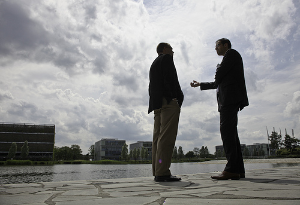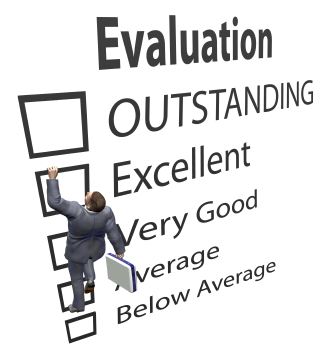One of the Vistage Chairs I work with recently expressed concern that he might be “over-chairing.” The term caught my attention as it seemed to be another name for over-managing, over-parenting, or any number of other over-lording situations.
That set me to reflecting on the behaviors I have observed over the last couple of decades of working with Chairs, leaders and parents and there seems to be common traits and mindsets driving them. Most common of all is the often delusionalbelief that tightly controlling the conversations, processes and relationships will produce desired high-quality outcomes. Generally, this assumption is false. It is driven by your needs versus the recipients’ wishes and points-of-view.
The delusional dimension is that you can be comfortable in your belief that you are doing your best and assuring the best outcomes, even in the face of data to the contrary. In the case of children, (especially teens), the contrary outcomes may be multiple while you continue to assert your right to say how it should go. Good luck with that!
So what’s really going on and what is actually being assured? First, you can continue to ignore what’s before your eyes and feel comfortable that you are doing your best. Second, you can avoid the discomfort that your best is not necessarily producing your desired outcomes. Third, you can avoid the discomfort or downright fear of having to "dance with the unknown” by including the other party as an equal partner in solutions, strategies and processes that get implemented. It’s unknown since you lose control of the outcome and probably have little to no idea of how to get to a productive outcome in such a dynamic.
Another discomforting dimension is that your “shame," or “original wound” will jump up and the seemingly real threat that you will be judged as your own personal version of worthless or incompetent.
A powerful antidote that will give you the capacity to dive headlong into the unknown is our Productive Dialogue Zone (more about this in our book, "Accelerate"). Working with that approach, you will be required to articulate your vision or desired outcome for the conversation, summon the courage to go forward as you let go of how and when, be sure you are staying connected or in relationship with the other, and also challenging or confronting the issue(s) as you see it. Notice I said confronting the issue(s), not the person. Confronting the person has them withdraw from the relationship and you will have lost your ability to partner in producing the best possible outcome.
Study the model, summon the courage, and start letting go. Practice on easier challenges until you gain facility with engaging in Productive Interactions. Enjoy new and unexpected outcomes.



 For the last 4 years or so we have developed a set of ideas we call Lean Conversations. The fundamental notion is that academicians, consultants, leaders, and managers in our culture have focused on and accomplished tremendous gains in productivity through process improvement, supply chain management, IT, and a host of manufacturing concepts including Lean Manufacturing. The area that has been largely overlooked as an opportunity for improvement in productivity is the friction and waste that occurs in the conversations people have with each other as they go about their daily work together. By friction and waste we mean the upsets, resistance, broken promises, undelivered communications, failed intentions, etc., etc. (You get the picture.)
We have long believed the single biggest key to productivity gains in our economy today is to identify and clear upsets, first in ourselves, and then in others. Over many years with our clients we have conducted a sort of “informal qualitative survey,” by asking them, “ if people in your organization just came to work, did their jobs, and went home without having upsets, issues with each other, their work, etcetera, what time could you go home?” Consistently we would hear they could go home between 10:30 and 11:00 a.m. This answer used to surprise us until we heard it over and over
For the last 4 years or so we have developed a set of ideas we call Lean Conversations. The fundamental notion is that academicians, consultants, leaders, and managers in our culture have focused on and accomplished tremendous gains in productivity through process improvement, supply chain management, IT, and a host of manufacturing concepts including Lean Manufacturing. The area that has been largely overlooked as an opportunity for improvement in productivity is the friction and waste that occurs in the conversations people have with each other as they go about their daily work together. By friction and waste we mean the upsets, resistance, broken promises, undelivered communications, failed intentions, etc., etc. (You get the picture.)
We have long believed the single biggest key to productivity gains in our economy today is to identify and clear upsets, first in ourselves, and then in others. Over many years with our clients we have conducted a sort of “informal qualitative survey,” by asking them, “ if people in your organization just came to work, did their jobs, and went home without having upsets, issues with each other, their work, etcetera, what time could you go home?” Consistently we would hear they could go home between 10:30 and 11:00 a.m. This answer used to surprise us until we heard it over and over  again. Let’s allow for gross overstatement and cut that savings in half. Even with this modification it appears there is at least two to four hours of time savings available for the leaders, (and presumably everyone else in the organization), if there were less upsets, less confusion and fewer issues in people’s interactions with each other. Bottom line, this means ther are potentially enormous opportunities for gains in productivity right in front of us, largely unnoticed, (or framed in that way), and largely unleveraged.
again. Let’s allow for gross overstatement and cut that savings in half. Even with this modification it appears there is at least two to four hours of time savings available for the leaders, (and presumably everyone else in the organization), if there were less upsets, less confusion and fewer issues in people’s interactions with each other. Bottom line, this means ther are potentially enormous opportunities for gains in productivity right in front of us, largely unnoticed, (or framed in that way), and largely unleveraged. “If you expect performance, then make it [meaning your expectations] ’acutely clear’ so people have the opportunity to succeed.” -- Jim Moats
A very thoughtful leader, friend, and fellow
“If you expect performance, then make it [meaning your expectations] ’acutely clear’ so people have the opportunity to succeed.” -- Jim Moats
A very thoughtful leader, friend, and fellow  Being 'acutely clear,' (as Jim Moats describes), and in partnership with those around you, puts you in what we call in our book "
Being 'acutely clear,' (as Jim Moats describes), and in partnership with those around you, puts you in what we call in our book " On a recent evening in a beach bar on a quiet bay in the Grenadines where our sailboat was anchored for the night, I met a gentle soul named Alvin who was native born and raised on the island. Despite the idyllic setting, Alvin was a troubled man. On the surface, he had little education, jobs are scarce, and he is in a desperate struggle financially. For many of us, that would be enough to cause us to give up. However, Alvin's troubles ran even deeper.
Alvin said he longed for connection and conversation. He said his own people are very "contentious" with each other, leaving little- to-no room for meaningful relationships. His observation was so sincere and heartfelt that it "hooked me." I've been thinking about it ever since. How many times do I hear people say in meetings, "I disagree with that..." “You’re wrong about that…” or “You’re confused…” as if that approach was useful rather than instantly causing disconnection and the need to defend oneself.
On a recent evening in a beach bar on a quiet bay in the Grenadines where our sailboat was anchored for the night, I met a gentle soul named Alvin who was native born and raised on the island. Despite the idyllic setting, Alvin was a troubled man. On the surface, he had little education, jobs are scarce, and he is in a desperate struggle financially. For many of us, that would be enough to cause us to give up. However, Alvin's troubles ran even deeper.
Alvin said he longed for connection and conversation. He said his own people are very "contentious" with each other, leaving little- to-no room for meaningful relationships. His observation was so sincere and heartfelt that it "hooked me." I've been thinking about it ever since. How many times do I hear people say in meetings, "I disagree with that..." “You’re wrong about that…” or “You’re confused…” as if that approach was useful rather than instantly causing disconnection and the need to defend oneself.  This week we are leading a customized version of our
This week we are leading a customized version of our  What I have been seeing in the past six weeks or so among my clients is what I would call, "The Paradox of the Double Dip." Let me explain. As you all know the economy and financial markets crashed badly. In March we saw "the low" and the economy was supposed to be on the road to recovery. Now we are seeing another down trend and the term "the double dip" is being discussed - meaning a second dip that might indicate the economy is not actually on the road to recovery after all. I am hearing "the sky is falling" from a variety of people about what's happening. I am also hearing comparisons to the '80s when we had the S&L scandal and Japan's economy tanked. The US recovered from the S&L scandal and cleaned up its mess. Japan did not recover in the same way and in fact is still experiencing repercussions because of the actions they did not take. In the current scenario we are being compared to Japan and the fear is our economy is going to be a mess for an undetermined length of time.
The problem with all of this from a leadership standpoint is that instead of Napoleon Hill's "Think and Grow Rich" we are in a "speak and grow poor" mentality and this will become a self-fulfilling prophecy.
What I have been seeing in the past six weeks or so among my clients is what I would call, "The Paradox of the Double Dip." Let me explain. As you all know the economy and financial markets crashed badly. In March we saw "the low" and the economy was supposed to be on the road to recovery. Now we are seeing another down trend and the term "the double dip" is being discussed - meaning a second dip that might indicate the economy is not actually on the road to recovery after all. I am hearing "the sky is falling" from a variety of people about what's happening. I am also hearing comparisons to the '80s when we had the S&L scandal and Japan's economy tanked. The US recovered from the S&L scandal and cleaned up its mess. Japan did not recover in the same way and in fact is still experiencing repercussions because of the actions they did not take. In the current scenario we are being compared to Japan and the fear is our economy is going to be a mess for an undetermined length of time.
The problem with all of this from a leadership standpoint is that instead of Napoleon Hill's "Think and Grow Rich" we are in a "speak and grow poor" mentality and this will become a self-fulfilling prophecy. One of the foundational pieces of our philosophy at 2130 Partners is our set of Operating Principles. One of these Principles is "Be Responsible for What Gets Heard."
One of the foundational pieces of our philosophy at 2130 Partners is our set of Operating Principles. One of these Principles is "Be Responsible for What Gets Heard." Have you ever wondered whether there is any common language that exists for all humans and, if so, how knowing about that language might help you be a more effective as a leader? Well, there is and researchers have called it “deep metaphors.”
In the November/December 2008 issue of
Have you ever wondered whether there is any common language that exists for all humans and, if so, how knowing about that language might help you be a more effective as a leader? Well, there is and researchers have called it “deep metaphors.”
In the November/December 2008 issue of  In May I was forwarded an email written by Shama Kabani (@Shama). [She runs an
In May I was forwarded an email written by Shama Kabani (@Shama). [She runs an  coming from McKinsey and recapped by Shama in her email. I found them compelling because in addition to my role as Principal and Co-founder of 2130 Partners I am also a Best Practice Chair at
coming from McKinsey and recapped by Shama in her email. I found them compelling because in addition to my role as Principal and Co-founder of 2130 Partners I am also a Best Practice Chair at  Many of the statements and conversations that pass for normal today are filled with words and phrases that have no power and fill the conversational space with the false implication of action. This type of communication seems to keep the speaker from being present to his or her own experience and commitment, (or, more likely, lack thereof).
Let’s start with the word "like." Admittedly this overused word is mostly in the younger set. It seems to be a substitute for being articulate enough to share one’s own experience accurately and authentically. As an example, the phrase “it’s like I’m cold,” - does that mean you are? You aren't? Why not just state “I am cold?” Including "like" seems to allow a lot of talk without much real connection to personal experience. The words speak to an experience that is similar or "like," rather than a statement that owns one's physical state in that moment.
Many of the statements and conversations that pass for normal today are filled with words and phrases that have no power and fill the conversational space with the false implication of action. This type of communication seems to keep the speaker from being present to his or her own experience and commitment, (or, more likely, lack thereof).
Let’s start with the word "like." Admittedly this overused word is mostly in the younger set. It seems to be a substitute for being articulate enough to share one’s own experience accurately and authentically. As an example, the phrase “it’s like I’m cold,” - does that mean you are? You aren't? Why not just state “I am cold?” Including "like" seems to allow a lot of talk without much real connection to personal experience. The words speak to an experience that is similar or "like," rather than a statement that owns one's physical state in that moment. If you take this on and find yourself uncomfortable, make note of what your mind is saying is going to happen to you or how your internal dialogue is criticizing you. Use your self-awareness skills and you will likely find what's stopping you is a limiting belief. Once identified, you can go to work on letting go of it. Check out
If you take this on and find yourself uncomfortable, make note of what your mind is saying is going to happen to you or how your internal dialogue is criticizing you. Use your self-awareness skills and you will likely find what's stopping you is a limiting belief. Once identified, you can go to work on letting go of it. Check out  Let's talk about a set of ideas we have been evolving for several years that we call Lean Conversations. The fundamental notion is that academicians, consultants, leaders, and managers in our culture have focused on and accomplished tremendous gains in productivity through process improvement, supply chain management, IT, and a host of manufacturing concepts including Lean Manufacturing. The area that has been largely overlooked as an opportunity for improvement in productivity is the friction and waste that occurs in the conversations people have with each other as they go about their daily work together. By friction and waste we mean the upsets, resistance, broken promises, undelivered communications, failed intentions, etc., etc. (You get the picture.)
We have long believed
Let's talk about a set of ideas we have been evolving for several years that we call Lean Conversations. The fundamental notion is that academicians, consultants, leaders, and managers in our culture have focused on and accomplished tremendous gains in productivity through process improvement, supply chain management, IT, and a host of manufacturing concepts including Lean Manufacturing. The area that has been largely overlooked as an opportunity for improvement in productivity is the friction and waste that occurs in the conversations people have with each other as they go about their daily work together. By friction and waste we mean the upsets, resistance, broken promises, undelivered communications, failed intentions, etc., etc. (You get the picture.)
We have long believed